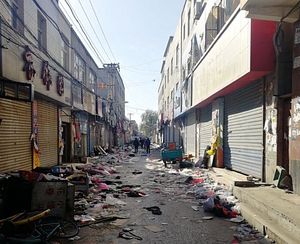While Americans were enjoying the Thanksgiving holiday, China’s capital Beijing has been busy kicking thousands of migrant workers out of their rental homes and into the cold winter, under a grand campaign of demolishing illegal construction and maintaining urban safety.
The campaign was triggered by a tragedy.
On November 18, a fire broke out in a cramped and inexpensive two-story building in the Daxing District — an area covering the southern suburbs of Beijing. The fire killed 19 people and injured eight people at least. The majority of the victims were low-income migrant workers or their parents and children. One family, for example, lost both grandparents and two young children in the fire, according to the casualty list.
While the whole country was still mourning the tragedy and questing the cause, the Beijing municipal government immediately launched a 40-day campaign to demolish all the illegal construction posing a potential fire hazards.
When kicking off the campaign on November 20, the city’s top leader, Cai Qi, made it clear in a conference that the special operation would involve a large-scale inspection, clean-up, and tear-down across the city. Cai underlined that the operation would focus on suburban areas, industrial enterprises, construction sites, old districts, big rental compounds, public playgrounds, and underground spaces. Most of these areas provided homes or gathering places to low-income migrants workers and small businessmen.
Soon, the campaign swept the whole city. Multiple districts or villages have issued notices, demanding that residents move out within an extremely short period — in three days, for example — without any compensation. There were multiple videos posted online showing groups of local policemen forcing people to relocate, huge crowds dragging bags and packages along the streets, and bulldozers tearing down buildings. While the accurate number remains unclear, it’s widely believed that at least thousands of residents living in above areas have been driven out of their makeshift homes so far; numerous small shops, bars, factories, hotels, and tiny suburban restaurants have been closed down.
In fact, the lethal fire was just a catalyst for the mass eviction. The city’s authorities have been planning to get rid of these migrant workers, or so-called “low-end population,” for months, but the eviction was never so blatant before the latest campaign.
As The Diplomat reported earlier, in September, Chinese top authorities — the Central Committee of the Chinese Communist Party (CCP) and the State Council — approved the general city plan for Beijing, demanding that the city should strictly control its scale and maintain a 23 million permanent population cap by 2020.
Although this plan didn’t clarify exactly how to control the population, multiple documents released earlier by the municipal government specified that those less-educated, low income people — or so-called “low-end labor”– are the main population the city will seek to get rid of.
On November 24, the Beijing Daily — the Beijing government’s mouthpiece — published an article defending the campaign, writing that the government wasn’t targeting any “low-end population” but safeguarding the city’s safety.
Regardless of the government line, the mass eviction has prompted public outrage. Chinese netizens have been condemning the Beijing authorities sharply on social media.
On November 24, more than 100 Chinese intellectuals signed a petition urging the top Chinese authorities to immediately stop the eviction, which they called “vicious conduct that breaks the law and the Constitution and seriously tramples on human rights.”
Even Global Times, the traditionally pro-government national newspaper, issued an editorial, saying, “It’s not reasonable for Beijing to close its doors to” non-local people, although the editorial maintained that the government’s intention is good.
However, the Chinese authorities’ only reaction to this national outrage was fierce censorship: hundreds of commentaries posted on social media by Chinese citizens, as well as a series of Chinese media reports, were deleted within hours.
Despite the government’s response, many local citizens and non-governmental organizations have volunteered to provide temporary lodging and moving services to those people who have suddenly lost their homes. The volunteers cautiously published that information on social media without using sensational rhetoric, so as not to attract the censors’ attention. Ironically, even this kind of information could not escape deletion by the censors. In response, Chinese netizens just simply re-posted the offers of help again and again.
In Beijing’s freezing dark nights, these volunteers appeared to be the only beam of light to many displaced migrant workers.

































